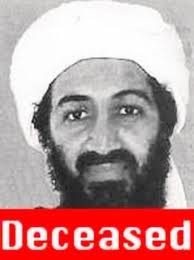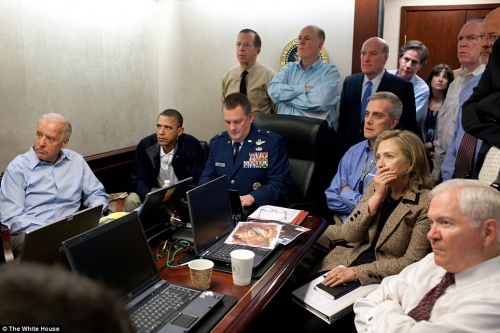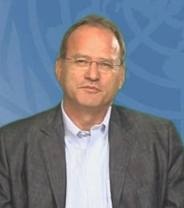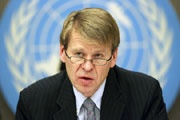



Was there a plan to capture or merely to execute from the outset? Two Independent United Nations human rights experts today called on the United States to disclose further details of the recent killing of Osama bin Laden, particularly if there were plans to capture him alive. Christof Heyns, the expert dealing with extrajudicial, summary or arbitrary executions, and Martin Scheinin, who deals with human rights and counter-terrorism issued a joint statement(Photo Attached Above):
“In respect of the recent use of deadly force against Osama bin Laden, the United States of America should disclose the supporting facts to allow an assessment in terms of international human rights law standards, For instance it will be particularly important to know if the planning of the mission allowed an effort to capture Bin Laden, It may well be that the questions that are being asked about the operation could be answered, but it is important to get this into the open.”
These two UN experts, who report in an independent and unpaid capacity to the UN Human Rights Council, noted that in certain exceptional cases, use of deadly force may be permissible as a measure of last resort in accordance with international standards on the use of force, to protect life, including in operations against terrorists.
However, the norm should be that terrorists be dealt with as criminals, through legal processes of arrest, trial and judicially decided punishment,” they stated. Actions taken by States in combating terrorism, especially in high profile cases, set precedents for the way in which the right to life will be treated in future instances.”
Below is full text of the Joint Statement offered by the two UN mandated experts:
----
“The Special Rapporteur on extrajudicial, summary or arbitrary executions, Christof Heyns, and the Special Rapporteur on the promotion and protection of human rights and fundamental freedoms while countering terrorism, Martin Scheinin, have issued the following statement:
“Acts of terrorism are the antithesis of human rights, in particular the right to life. In certain exceptional cases, use of deadly force may be permissible as a measure of last resort in accordance with international standards on the use of force, in order to protect life, including in operations against terrorists. However, the norm should be that terrorists be dealt with as criminals, through legal processes of arrest, trial and judicially decided punishment.
Actions taken by States in combating terrorism, especially in high profile cases, set precedents for the way in which the right to life will be treated in future instances.
In respect of the recent use of deadly force against Osama bin Laden, the United States of America should disclose the supporting facts to allow an assessment in terms of international human rights law standards. For instance it will be particularly important to know if the planning of the mission allowed an effort to capture Bin Laden.
It may well be that the questions that are being asked about the operation could be answered, but it is important to get this into the open.”
The Special Rapporteur on extrajudicial, summary or arbitrary executions, Christof Heyns, is Professor of Human Rights Law at the University of Pretoria, South Africa, and Co-director of the Institute for International and Comparative Law in Africa. He is a former dean of the Faculty of Law and a former Director of the Centre for Human Rights at the same university. He has engaged in wide-reaching initiatives on human rights in Africa. He has advised a number of international, regional and national entities on human rights issues. Learn more, log on to:
www2.ohchr.org/english/issues/executions/index.htm
Martin Scheinin was appointed Special Rapporteur on the promotion and protection of human rights and fundamental freedoms while countering terrorism by the former United Nations Commission on Human Rights in August 2005. The mandate was last renewed by the Human Rights Council in October 2010. As Special Rapporteur, he is independent from any Government and serves in his individual capacity. He is Professor of Public International Law at the European University Institute in Florence. Learn more, log on to:
www2.ohchr.org/english/issues/terrorism/rapporteur/srchr.htm “
The killing of Osama Bin Laden can be seen in context of the specific person or in terms of a potential precedent. Thus, there may be a direct contradiction – killing a despised and potentially still dangerous person versus a summary execution tinted with vengeance rather than the rule of law. The issue is neither settled by whether Osama Bin Laden was a suspect “criminal” or an enemy combatant subject merely to the rules of war. Questions of summary execution are relevant to both criminal and international conflict (battlefield) circumstances.
As I indicated in my previous posting, providing diplomatic cover after the fact, may have been one of the objectives sought in the UN Security Council “Presidential Statement” issued the day after Bin Laden’s killing. (See “Diplomatic Cover for Bin Laden Killing” -
diplomaticallyincorrect.org/films/blog_post/diplomatic-cover-for-bin-laden-killing-by-ambassador-mo/27767
Related Reports –
--- “Osama’s Bomb-maker” -
diplomaticallyincorrect.org/films/movie/osamas-bomb-maker/26648
--- “ UN Reacts to Osama Bin Laden Death “ -
diplomaticallyincorrect.org/films/movie/osama-bin-laden-un-reacts/26624
---“Bin Laden Dead/US President Obama” -
diplomaticallyincorrect.org/films/movie/osama-bin-laden-dead-us-president-obama/26618
By Ambassador Muhamed Sacirbey
Face Book at “Diplomatically Incorrect”
Twitter – DiplomaticallyX







